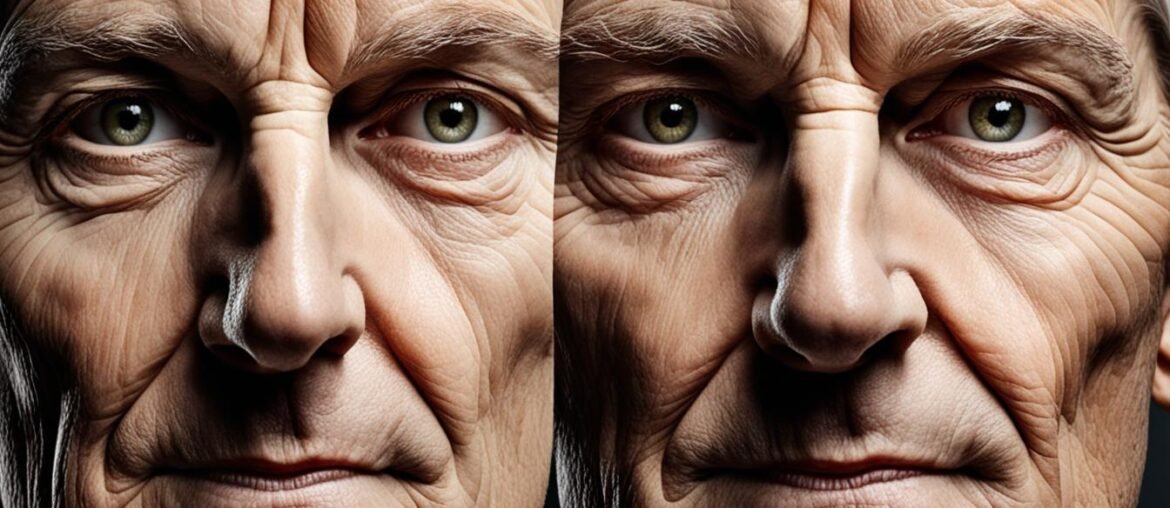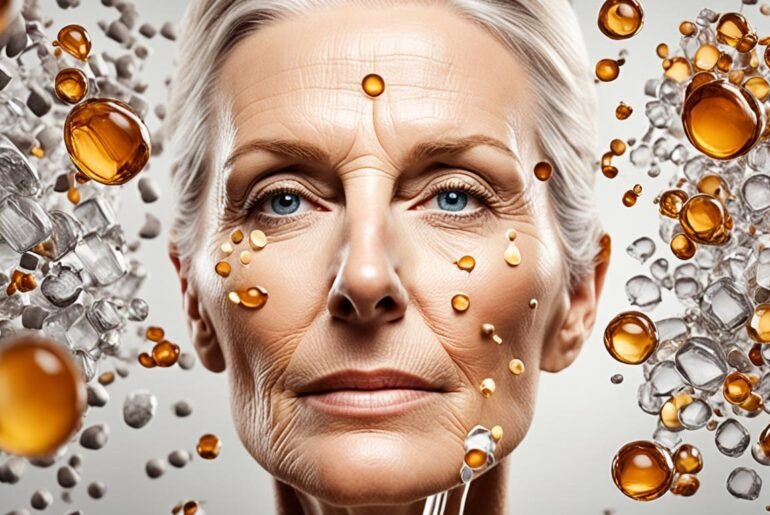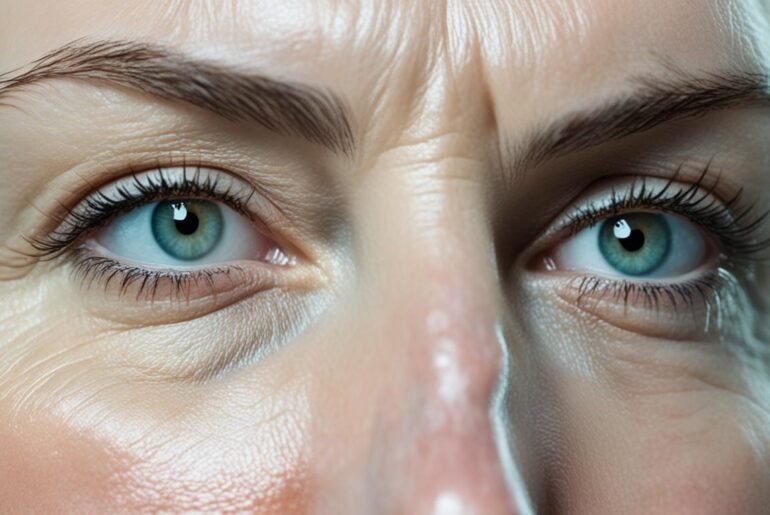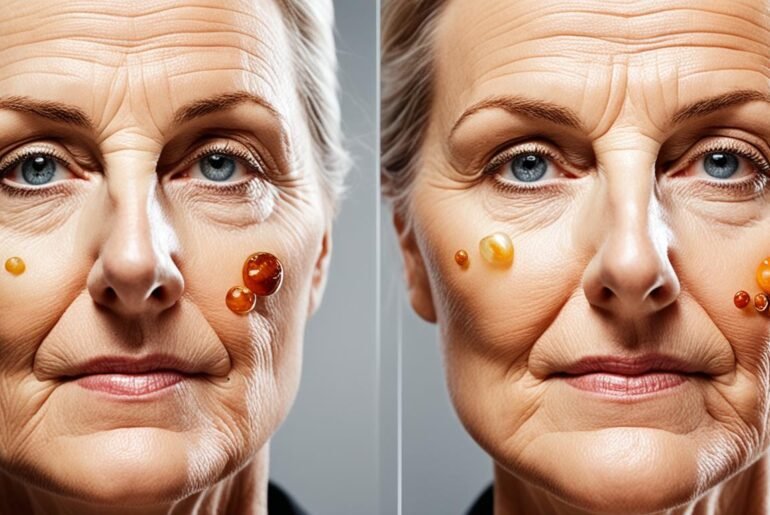Did you know that alcohol consumption can dramatically accelerate the aging process of your facial skin? Research studies have uncovered shocking evidence of the detrimental effects of alcohol on our skin, including the increased severity of wrinkles, dehydration, inflammation, and collagen damage. These effects can lead to premature aging, leaving us with a complexion that appears older and less vibrant than it should.
Key Takeaways:
- Alcohol consumption can have a significant impact on facial skin aging, causing increased severity of wrinkles and contributing to premature aging.
- Alcohol dehydrates the skin, leading to dryness and dullness.
- Alcohol causes inflammation in the skin, resulting in redness and flushing.
- Excessive alcohol consumption leads to collagen degradation, leading to a loss of skin firmness and the formation of wrinkles.
- Alcohol consumption can also affect skin tone, texture, elasticity, and overall skin health.
The Effects of Alcohol on Skin Health
Alcohol consumption can have detrimental effects on skin health, leading to various issues such as inflammation, dehydration, and decreased elasticity. These effects can significantly impact the appearance and overall health of the skin.
Inflammation and Redness
One of the key effects of alcohol on the skin is inflammation. The consumption of alcohol can trigger an inflammatory response in the skin, leading to redness and flushing. This inflammation can also exacerbate existing skin conditions such as acne and rosacea.
“Alcohol-induced inflammation can cause redness and irritation in the skin, making it appear flushed and sensitive.”
Dehydration and Dryness
Another consequence of alcohol consumption is skin dehydration. Alcohol is a diuretic, which means that it increases urine production and ultimately leads to increased water loss from the body. As a result, the skin becomes dehydrated, leading to dryness, flakiness, and a dull complexion.
To combat the effects of alcohol-induced dehydration, it is crucial to prioritize hydration by drinking plenty of water and using moisturizing skincare products.
Decreased Elasticity and Wrinkles
Alcohol can also diminish the skin’s elasticity, making it prone to the formation of wrinkles and sagging. The excessive consumption of alcohol can disrupt the production of collagen, a protein responsible for maintaining the skin’s structure and firmness. This collagen degradation leads to a loss of elasticity and promotes the development of wrinkles.
Protecting the skin’s elasticity and minimizing the appearance of wrinkles can be achieved through a combination of limiting alcohol intake, following a consistent skincare regimen, and incorporating products that promote collagen production.
Overall, the effects of alcohol on skin health are significant and should not be taken lightly. It is important to be aware of the potential harm that alcohol can cause and to prioritize skincare practices that counteract these effects. By adopting a holistic approach to skincare and reducing alcohol consumption, individuals can maintain healthier, more resilient skin.
Alcohol and Collagen Degradation
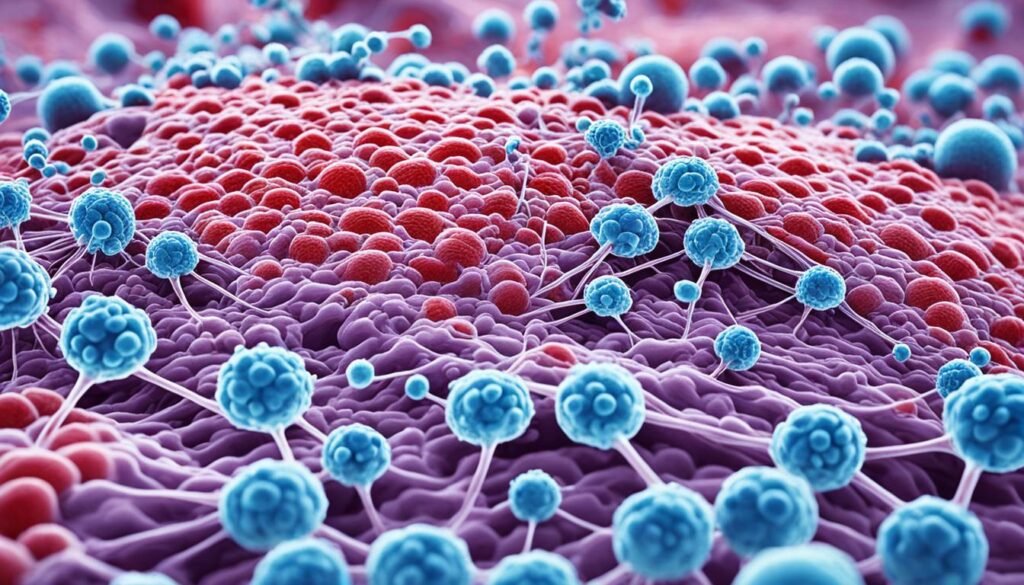
Collagen, a vital protein responsible for providing structure and elasticity to the skin, plays a crucial role in maintaining its youthful appearance. However, excessive alcohol consumption can contribute to the degradation of collagen, leading to several undesirable skin effects.
Alcohol’s detrimental impact on collagen synthesis inhibits its production and disrupts the delicate balance required for healthy skin. Consequently, the skin loses its firmness, elasticity, and resilience, making it more susceptible to the formation of wrinkles and fine lines.
Studies have shown that alcohol-induced collagen degradation significantly accelerates the skin’s aging process, resulting in premature signs of aging such as sagging skin, loss of facial volume, and a less vibrant complexion. The effects of collagen breakdown are particularly evident in individuals who consume alcohol heavily over extended periods.
It’s crucial to note that collagen degradation caused by alcohol is both a cosmetic and structural concern. As collagen levels decline, the skin’s natural support system weakens, leading to a loss of firmness and elasticity over time.
“Excessive alcohol consumption can disrupt the delicate balance of collagen synthesis, leading to accelerated skin aging, including the formation of wrinkles and sagging skin.”
Protecting and replenishing collagen levels is essential for maintaining youthful, healthy-looking skin. Reducing alcohol consumption can help mitigate collagen degradation and its associated skin aging effects.
In addition to limiting alcohol intake, incorporating skincare products containing collagen-boosting ingredients, such as retinol and peptides, can help stimulate collagen production and improve skin elasticity. A comprehensive skincare routine that includes regular cleansing, moisturizing, and protection against environmental stressors is also crucial in supporting collagen health and overall skin wellness.
Collagen-Promoting Skincare Ingredients:
| Ingredient | Description |
|---|---|
| Retinol | A derivative of vitamin A, retinol promotes collagen synthesis and reduces the appearance of wrinkles. |
| Peptides | These small proteins stimulate collagen production and improve skin firmness and elasticity. |
| Vitamin C | A potent antioxidant that helps protect existing collagen and supports the formation of new collagen. |
By taking proactive steps to preserve collagen levels and adopting a collagen-supportive skincare routine, individuals can counteract alcohol’s negative impact on skin health and promote a more youthful and resilient complexion.
Impact of Alcohol on Skin Aging Signs
Alcohol consumption can have a significant impact on the signs of skin aging. The effects of alcohol on the skin include the formation of wrinkles, especially in areas such as the forehead, crow’s feet, and glabellar lines. Excessive alcohol consumption can also contribute to the development of fine lines, sagging skin, and a loss of facial volume.
This is particularly noticeable in individuals who consume alcohol heavily, as alcohol can dehydrate the skin and impair its natural ability to retain moisture. The resulting dryness and lack of elasticity can lead to the appearance of wrinkles and fine lines. Additionally, alcohol can weaken the connective tissues in the skin, causing it to sag and lose its firmness.
It’s worth noting that alcohol’s impact on skin aging signs can vary from person to person. Factors such as genetics, overall health, and lifestyle choices can influence the severity of these effects. However, reducing alcohol intake and adopting a comprehensive skincare routine can help mitigate the negative impact on the skin and maintain a more youthful appearance.
Alcohol’s Impact on Skin Tone and Texture
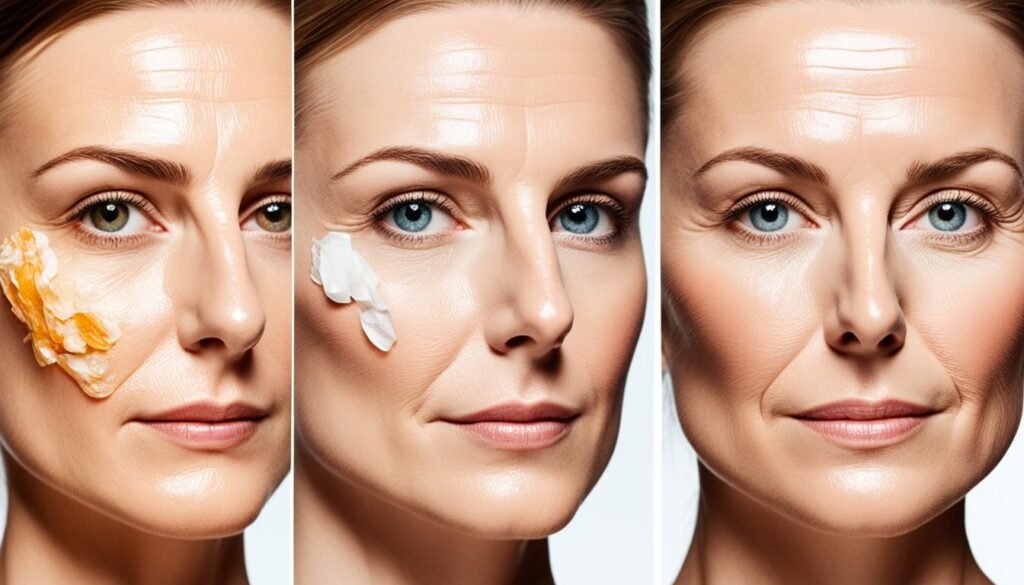
Alcohol consumption can have a significant impact on skin tone and texture. It can lead to various issues such as uneven skin tone, skin discoloration, and pigmentation problems. When alcohol is regularly consumed, it disrupts the production of melanin, the pigment responsible for skin color. This disruption can result in an uneven and dull complexion. Additionally, alcohol can hinder the skin’s natural repair process, leading to rough and textured skin.
Regular alcohol consumption can disturb the balance of melanin production in the skin, which can result in an uneven skin tone and discoloration. The impairment in the skin’s ability to repair itself caused by alcohol can lead to an unhealthy and rough texture. It’s essential to recognize the negative effects of alcohol on skin tone and texture and take necessary steps to protect and maintain skin health.
One way to address these concerns is by incorporating a skincare routine that focuses on hydration and nourishment. Using gentle cleansers, moisturizers, and serums can help replenish the skin’s moisture barrier and improve its texture. Additionally, incorporating exfoliation and brightening products into the skincare routine can help promote a more even skin tone and reduce discoloration caused by alcohol.
Protecting the skin from harmful UV rays is also crucial in maintaining a healthy skin tone and texture. Applying sunscreen daily and seeking shade when spending time outdoors can help prevent further damage and maintain a more even complexion.
By reducing alcohol consumption and adopting a comprehensive skincare routine, individuals can minimize the negative impact of alcohol on skin tone and texture. Prioritizing skin health is essential to maintaining a vibrant, even, and healthy-looking complexion.
Alcohol’s Effect on Skin Elasticity and Firmness
Alcohol consumption can have detrimental effects on the elasticity and firmness of the skin. When alcohol is consumed in excess, it can lead to a decrease in collagen production, resulting in a loss of skin elasticity. Collagen is a vital protein that gives the skin its firm and supple appearance. With reduced collagen levels, the skin becomes more susceptible to sagging and the formation of wrinkles.
Additionally, alcohol can affect the texture of the skin, contributing to a prematurely aged appearance. It can disrupt the natural processes of skin cell renewal and regeneration, leading to a rough and uneven skin texture. This can further exacerbate the visible signs of aging, such as fine lines and wrinkles.
To better understand the impact of alcohol on skin elasticity and firmness, take a look at the following table:
| Effect of Alcohol | Result on Skin Elasticity and Firmness |
|---|---|
| Collagen degradation | Loss of skin elasticity and firmness |
| Disrupted skin cell renewal | Rough and uneven skin texture |
| Poor skin hydration | Increased risk of sagging and wrinkles |
It is evident from the table that alcohol consumption can have detrimental effects on both skin elasticity and firmness. To maintain a healthy and youthful complexion, it is important to limit alcohol intake and adopt a comprehensive skincare routine that focuses on hydration, collagen support, and skin rejuvenation.
The Link Between Alcohol and Skin Conditions
Research has shown a clear link between alcohol consumption and the development or worsening of certain skin conditions. Two common skin issues that are associated with alcohol consumption are acne and rosacea.
Alcohol and Acne
Excessive alcohol consumption can contribute to the onset or exacerbation of acne. Alcohol increases inflammation in the skin, which can lead to the formation of pimples, blackheads, and whiteheads. Additionally, alcohol can dehydrate the skin, causing it to produce more oil, further clogging pores and promoting acne breakouts.
Alcohol and Rosacea
Rosacea is a chronic skin condition characterized by facial redness, visible blood vessels, and sometimes small bumps. Alcohol has been identified as a common trigger for rosacea flare-ups. It can cause blood vessels in the skin to dilate, resulting in facial redness and the appearance of broken blood vessels.
To summarize, alcohol can increase inflammation in the skin, leading to the development or worsening of conditions such as acne and rosacea. It is advisable to consume alcohol in moderation and take steps to manage these skin conditions through proper skincare and medical treatment, if necessary.
Protecting and Maintaining Skin Health
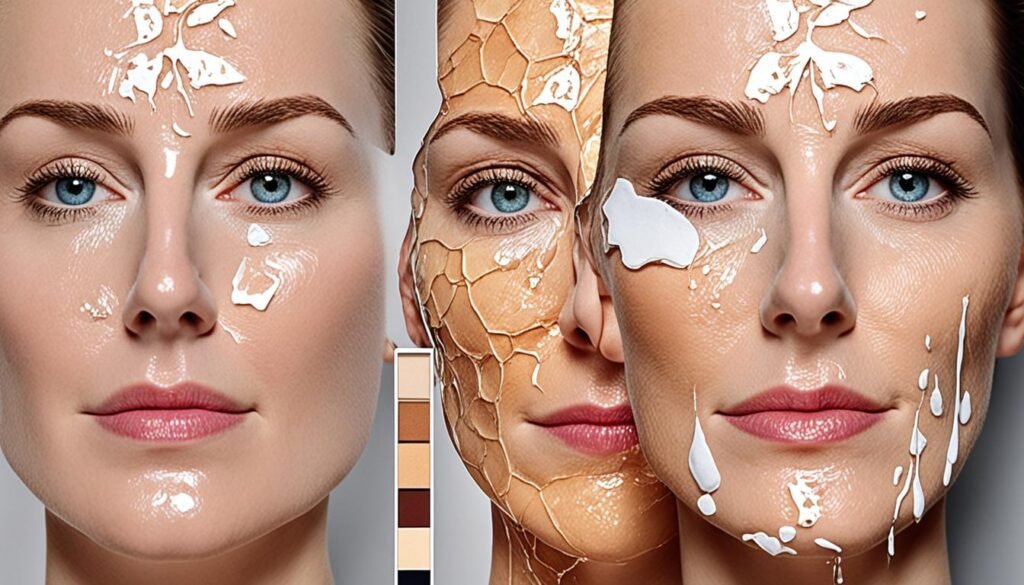
To protect and maintain skin health, it is important to prioritize a holistic approach that includes limiting alcohol consumption and adopting a proactive skincare routine. By incorporating these habits into your daily life, you can help safeguard your skin from the damaging effects of alcohol and nourish it for a healthy and vibrant appearance.
1. Limit Alcohol Consumption
Reducing alcohol consumption is crucial for maintaining skin health. Alcohol dehydrates the skin, leading to dryness, dullness, and an increased risk of age-related skin issues. By moderating your alcohol intake, you can help preserve your skin’s natural moisture and promote a more youthful complexion.
2. Adopt a Healthy Skincare Routine
A consistent skincare routine is essential for protecting and maintaining skin health. Follow these steps to keep your skin well-nourished:
- Cleanse: Use a gentle cleanser to remove dirt, oil, and impurities from your skin. This step helps to prevent clogged pores and maintain a healthy pH balance.
- Moisturize: Apply a moisturizer suited to your skin type to keep it hydrated and supple. Look for moisturizers that contain ingredients like hyaluronic acid or glycerin to lock in moisture.
- Protect: Apply a broad-spectrum sunscreen with an SPF of 30 or higher to shield your skin from harmful UV rays. Sun protection is crucial in preventing premature aging and protecting against skin cancer.
3. Stay Hydrated
Hydration is key to maintaining healthy skin. Drinking an adequate amount of water helps to flush out toxins, improves skin elasticity, and promotes a radiant complexion. Aim to drink at least eight glasses of water per day to keep your skin hydrated from within.
Tip: Incorporate antioxidant-rich products into your skincare routine. Antioxidants help combat the oxidative stress caused by alcohol consumption, protecting your skin from free radicals and other pollutants.
| Ways to Protect and Maintain Skin Health | Benefits |
|---|---|
| Avoid excessive alcohol consumption | – Prevents dehydration and dryness |
| Adopt a consistent skincare routine | – Cleanses, moisturizes, and protects the skin |
| Stay hydrated | – Improves skin elasticity and overall complexion |
| Incorporate antioxidant-rich products | – Guards against oxidative stress and free radicals |
By following these guidelines and prioritizing skin health, you can help protect your skin from the negative effects of alcohol and maintain a youthful, radiant complexion.
Conclusion
Excessive alcohol consumption can have detrimental effects on facial skin aging. The impact of alcohol on the skin includes an increase in the severity of wrinkles, dehydration, inflammation, collagen degradation, and a loss of skin elasticity. These negative effects can significantly accelerate the aging process, leading to a prematurely aged appearance.
To minimize the impact of alcohol on facial skin aging, it is important to reduce alcohol intake and prioritize skin health. Adopting a comprehensive skincare routine can help mitigate the negative effects of alcohol on the skin. This routine should include regular cleansing, moisturizing, and the use of sunscreen to protect the skin from further damage. Additionally, incorporating antioxidant-rich products can help counteract the harmful effects of alcohol on the skin.
By taking proactive steps to limit alcohol consumption and prioritize skincare, individuals can maintain a more youthful and vibrant appearance. Protecting and maintaining skin health is essential for combating the negative effects of alcohol on facial skin aging. By doing so, individuals can achieve healthier, more resilient skin that defies the signs of aging.
FAQ
What impact does alcohol have on facial skin aging?
Alcohol consumption can have a significant impact on facial skin aging. It can increase the severity of wrinkles, cause dehydration and inflammation, and damage collagen, leading to premature aging.
How does alcohol affect skin health?
Alcohol negatively affects skin health in multiple ways. It dehydrates the skin, causing dryness and dullness. It also causes inflammation, resulting in redness and flushing. Additionally, alcohol decreases the skin’s elasticity, leading to the formation of wrinkles and sagging.
What is the connection between alcohol and collagen degradation?
Excessive alcohol consumption can contribute to collagen degradation. Collagen is a protein that provides structure and elasticity to the skin. Alcohol disrupts collagen synthesis and inhibits the production of new collagen, resulting in accelerated skin aging.
How does alcohol impact skin aging signs?
Alcohol consumption can lead to the formation of wrinkles, especially in areas like the forehead, crow’s feet, and glabellar lines. It can also contribute to the development of fine lines, sagging skin, and a loss of facial volume.
What is the effect of alcohol on skin tone and texture?
Alcohol can lead to uneven skin tone, discoloration, and pigmentation issues. It disrupts the production of melanin, the pigment responsible for skin color, resulting in an uneven and dull complexion. Alcohol can also impair the skin’s ability to repair itself, leading to rough and textured skin.
How does alcohol affect skin elasticity and firmness?
Alcohol consumption can decrease collagen production, leading to a loss of skin elasticity and firmness. Over time, this can result in sagging skin and a lack of facial volume. Alcohol’s effects on skin texture can contribute to a prematurely aged appearance.
Is there a link between alcohol and certain skin conditions?
Yes, alcohol consumption is connected to the development or worsening of certain skin conditions. It can trigger or aggravate conditions like acne, by increasing inflammation in the skin. Alcohol can also worsen conditions like rosacea, leading to facial redness and visible blood vessels.
How can I protect and maintain my skin health?
To protect and maintain skin health, it is recommended to limit alcohol consumption and adopt a healthy skincare routine. This includes regular cleansing, using moisturizers and sunscreen, staying hydrated, and incorporating antioxidant-rich products into your skincare regimen.
What is the impact of alcohol on facial skin aging?
Excessive alcohol consumption can significantly accelerate facial skin aging. The effects include increased severity of wrinkles, dehydration, inflammation, collagen degradation, and a loss of skin elasticity. By reducing alcohol intake and prioritizing skincare, individuals can maintain a more youthful and vibrant appearance.

